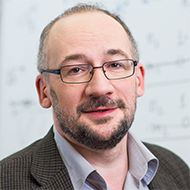- A
- A
- A
- ABC
- ABC
- ABC
- А
- А
- А
- А
- А
- HSE University
- Faculties
- Faculty of Computer Science
- School of Data Analysis and Artificial Intelligence
- News
- 5th Interntational Conference on Analysis of Images, Social Networks and Texts
-
The School
Pokrovsky boulevard, 11, room S938, Moscow, Russia, 109028
Phone: +7 (495) 772-95-90*27319
The School of Data Analysis and Artificial Intelligence was created in 2014 as part of the Department of Data Analysis and Artificial Intelligence. The school consists of world-renowned researchers who actively participate in international research projects.
Acquaye F. L., Kertesz-Farkas A., Stafford Noble W.
Journal of Proteome Research. 2023. Vol. 22. No. 2. P. 577-584.
Vasilii A. Gromov, Yury N. Beschastnov, Korney K. Tomashchuk.
PeerJ Computer Science. 2023. Vol. 9. No. .
Makhalova T., Kuznetsov S., Napoli A.
Data Mining and Knowledge Discovery. 2022. P. 108-145.
Dudyrev E., Semenkov Ilia, Kuznetsov S. et al.
Plos One. 2022. Vol. 17. No. 10.
Zhirayr Hayrapetyan, Nascimento S., Trevor F. et al.
In bk.: Information Systems and Technologies: WorldCIST 2022, Volume 2. Iss. 469. Springer, 2022. P. 141-147.
Dudyrev F., Neznanov A., Anisimova K.
In bk.: Artificial Intelligence in Education. Posters and Late Breaking Results, Workshops and Tutorials, Industry and Innovation Tracks, Practitioners’ and Doctoral Consortium -23rd International Conference, AIED 2022, Durham, UK, July 27–31, 2022, Proceedings, Part II. Springer, 2022. P. 436-439.
Egurnov D., Точилкин Д. С., Ignatov D. I.
In bk.: Complex Data Analytics with Formal Concept Analysis. Springer, 2022. P. 239-258.
Egurnov D., Ignatov D. I.
Automation and Remote Control. 2022. Vol. 83. No. 6. P. 894-902.
Kudriavtseva P., Kashkinov M., Kertész-Farkas A.
Journal of Proteome Research. 2021. Vol. 20. No. 10. P. 4708-4717.
Kanovich M., Kuznetsov S., Scedrov A.
Information and Computation. 2022. Vol. 287.

5th Interntational Conference on Analysis of Images, Social Networks and Texts
From the very beginning AIST is an alternative forum for young data scientists and students for exchange of ideas and experience with other practitioners of data analysis. The author of the AIST's conception is Rostislav Yavorsky (Associate professor, the department of DA&AI at the Computer Science Faculty). The conference traditionally takes place in Yekaternburg since the city is not only the scientific and industry center of Urals but it is nicely located on the crossroads between European and Asian parts of Russia. Invaluable help to oraganise the first AIST PC (as well in later years) was provided by Prof. Mikhail Khachay (IMM Ural branch of RAS and UrFU, Yekaternburg) and Dmitry Ignatov (Associate professor, the department of DA&AI at the CS Faculty). Olga Barinova (leading resercher at MSU and Yandex) helped a lot with the first two editions of the volume chairing its image processing and video chapters. The conference had demonstrated rapid growth and its third edition was published by Springer in English. To prepare this first English edition a lot was done by Dr. Alexander Panchenko (Université catholique de Louvain, Belgium) and Dr. Natalia Konstantionova (University of Wolverhampton, UK; Associate editor of Natural Language Engineering). Since the confrence continues its growth, this year more PC Chairs from different universities were involved, Prof. K. Vorontsov, N. Loukashevitch,Prof. V. Labunets, A. Savhcenko (HSE, Nizhniy Novgorod), S. Nikolenko (HSE, St. Petersburg).
A key feature of AIST is its rigorous reviewing process with a postproceedings publication model.
The first invited talk has been presented by Dr. Attilla Kertes-Farkas (Associate professor, the department of DA&AI at the CS Faculty) summarising his synergetic work on Machine Learning for Bioinformatics, based on the obtained results published in Bioinformatics and Nature.
The next speaker, Dr. Mehdi Kaytoue from INSA Lyon and CNRS Liris (Lyon, France), has talked about his joint project with colleagues from MIT about applications of Machine Learning and Data Mining for cyber athletes' behaviour in StarCraft 2.
It is not a secret that cybersport, i.e. professional computer gaming, now has million dollar prizes and attracts fans across the globe; moreover, cyber athletes can hide their true identity and play under different names. That's why identification and profiling in such cases is of high demand in game industry. It turns out that about 20 seconds of gaming process is enough to perform such detection…
The third invited talk on image restoration and denoising has been done by Dr. Radhakrishanan Delhibabu from Kazan Federal University. In their mutual work with Dr. Surya Prasath (University of Missouri-Columbia, USA), Dr. Delhibabu presented a diffusion-based approach to this end.
A number of talks have been done by faculty members, PhD students, and students of HSE.
Two first days of the quite dense scientific program have been followed by Business Day that has been fully devoted to real data analysis tasks coming from a range of data science companies: Mail.ru, Yandex Data Factory, Exactpro, Centre IT, Speech Technology Center, etc.
This year SNA-hackathon has been held in conjuction with AIST; it was co-organised with Mail.ru and OK.ru. The final round of the hackathon and the awards ceremony took place on the second conference day.
The organising team of AIST, coordinated by Euvgenia Vlasova, does a tremendous job uniting efforts of its many members and volunteers distributed between different companies, institutions, and regions.
More figures and facts are in the opening slides.
- About
- About
- Key Figures & Facts
- Sustainability at HSE University
- Faculties & Departments
- International Partnerships
- Faculty & Staff
- HSE Buildings
- HSE University for Persons with Disabilities
- Public Enquiries
- Studies
- Admissions
- Programme Catalogue
- Undergraduate
- Graduate
- Exchange Programmes
- Summer Schools
- Semester in Moscow
- Business Internship
- © HSE University 1993–2025 Contacts Copyright Privacy Policy Site Map
- Edit

